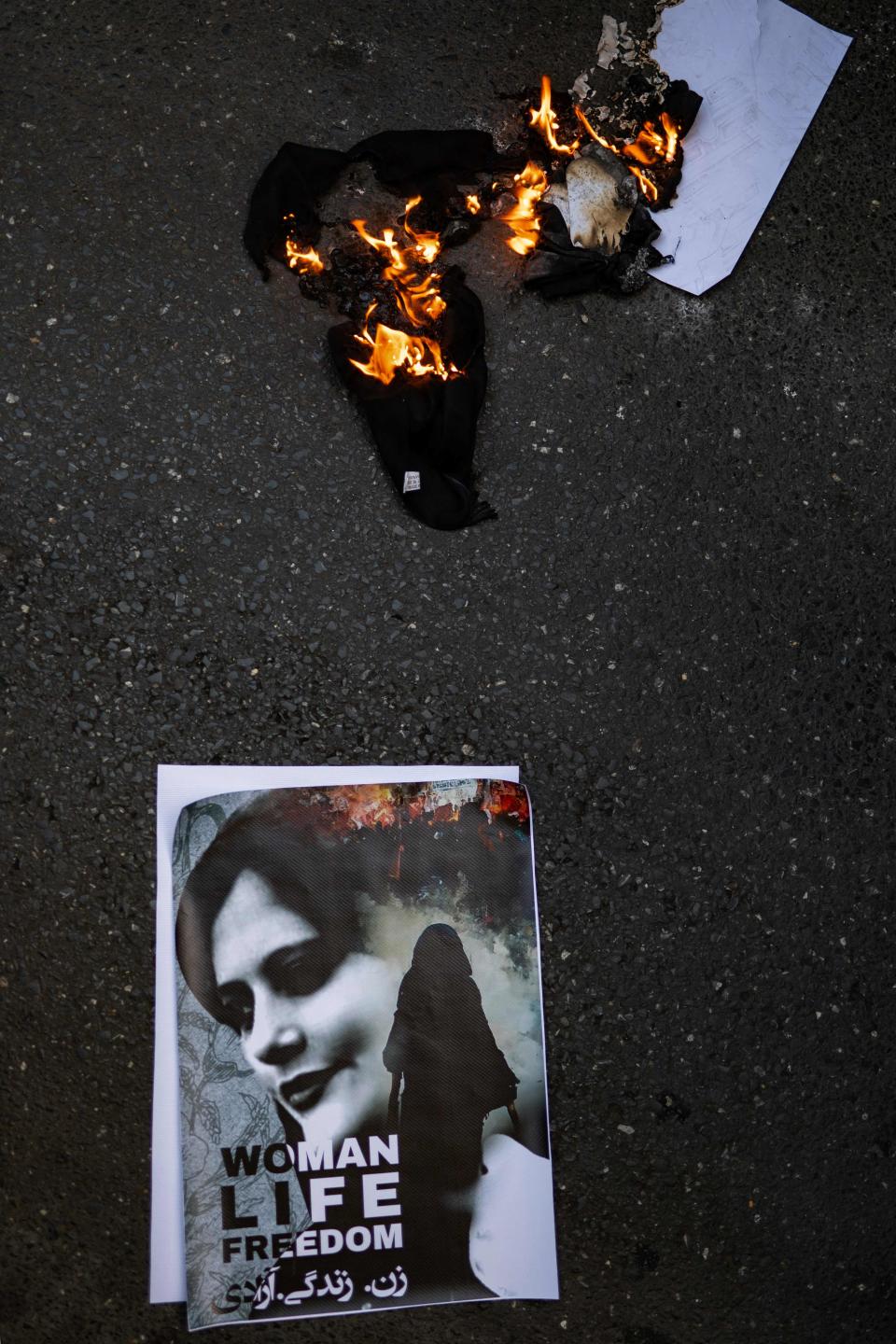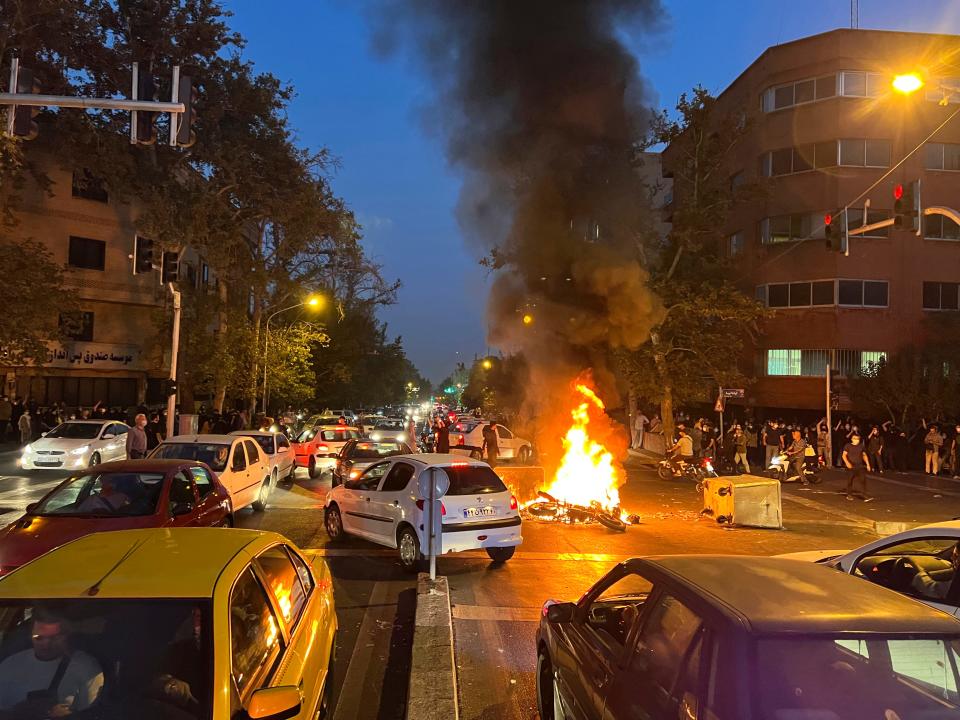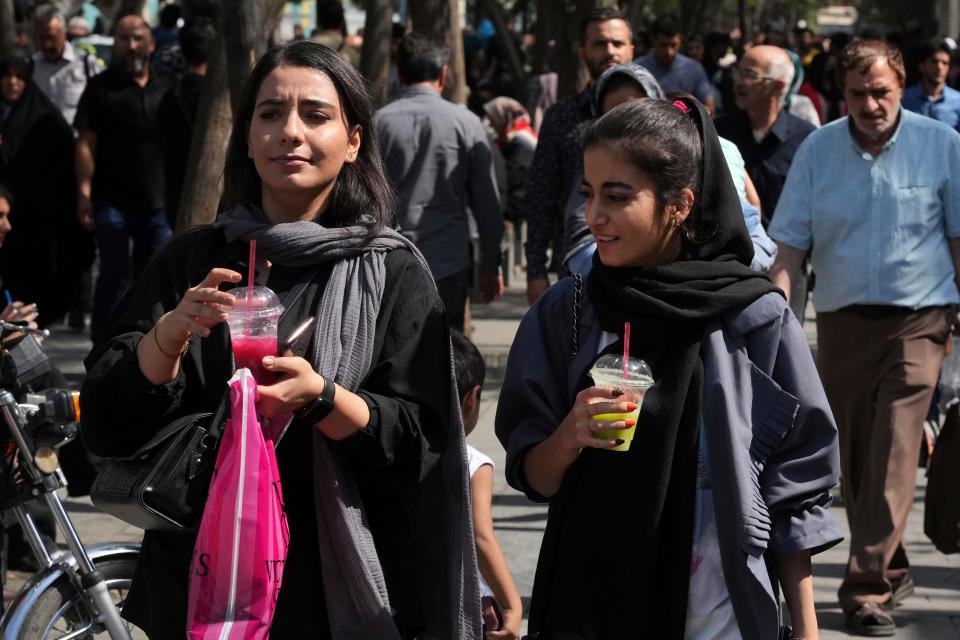'Woman, life, liberty': Iranians on why they'll risk beatings and death for change
Three weeks into nationwide protests triggered by the death of Mahsa Amini, a 22-year-old Kurdish-Iranian woman who was in custody after being arrested by Iran's "morality police," authorities continue to violently crack down on anti-regime demonstrators.
Amini was allegedly detained and beaten to death for not conforming to Iran's strict Islamic dress code, which includes, for women, a head covering known as a hijab.
As the uprisings have spread to dozens of cities, the government has blocked internet connectivity in Iran. There have been mass arrests of students, journalists, activists, artists, sports figures and celebrities who have, at great personal risk, expressed a range of social, economic and political grievances with Iran's hard-line government.
Official government tallies claim fewer than 20 people have been killed in the unrest, but human rights and opposition groups say the true figure is probably in the hundreds. In recent days, Iranian authorities have come under pressure to explain the death of Nika Shahkarami, a 16-year-old from Tehran who was followed by security agents and then disappeared after she posted images on Instagram of herself burning her headscarf.
Iran has seen large-scale anti-government protests before, but they have fizzled amid overwhelming brute force from Iran's security services. Still, many analysts and participants say these protests feel different, that dissenters have appeared more willing to brave beatings, arrest and even death as they demand justice and an end not only to mandatory hijab wearing but also to Iran's oppressive clerical regime.
Iran's supreme leader, Ayatollah Ali Khamenei, has blamed foreign influences for the protests, a common tactic in a country where the economy has been crippled by waves of U.S. sanctions.
'Sad part about this': What we know about Iran's response to protests over Mahsa Amini's death
Inside Iran: America’s contentious history in Iran leads to mix of anger, wonderment and weariness
USA TODAY interviewed protesters on an encrypted communications channel to hear directly about their demands and to understand how they have experienced the protests. Edited extracts of those interviews follow. For their safety, and to preserve anonymity, the last names of those interviewed have been withheld.

Vida, age 27
Female English teacher, Tehran
"I have been working for nine years and yet I haven’t been able to save any money even though I’m not a spender. Many educated hardworking people, whether younger or older than me, have the same issue in my country. They have been working hard for several years and yet they cannot afford the basics. At the same time, we have never had freedom of speech or choice for the simplest things like what clothes we want to wear.
"The Islamic Republic has been killing innocent people asking for their rights for more than 30 years. All of this has led to rage and anger. We are tired of discrimination, of the security forces and the murders. This is why we are protesting. We want to live with freedom. We want to be able to speak our minds freely and not be shot dead for doing so. We don’t want innocent people dying because of a hijab, like Mahsa Amini. We are all sick of being treated like prisoners in our own home country.
"People, specially young ones and women, have shown bravery, and they deserve to be heard. We deserve the change we want. We deserve life and freedom."

Pari, age 28
Female hair stylist and beauty blogger, Tehran
"'Hair' and 'women' are two inseparable parts of my day-to-day work. The burdens that this government applies to me affects me every single day, from what I can post online to the services I can offer my customers. These days I feel paralyzed. Just a few days ago, I was sitting in my car waiting for my friend to join me. Then suddenly white smoke surrounded the alley my car was in. After a few minutes I heard loud shouts and then suddenly about 20 undercover police were pointing at me with lasers. I was in shock. All I could do was watch the incident unfold. In fact, the police were not after me but a few teenagers who were protesting in the street nearby and had run into this alley. I snapped back to attention when I realized my eyes were burning from tear gas. All I could do in that moment was to knock on the first door and ask for help.
"After this incident my mind was full of questions: Should I stay and live in my country, or can I have a better life if I flee abroad? Why should I have to sacrifice the right to be with my parents, friends and family for a better life overseas? What would happen to the years of work I have done here, to what I’ve built with all the years of my youth!? Then again, here I can get killed by a random bullet, or just for my hair."

Mahan, age 21
Male law student, Mazandaran Province
"I was in the protests, both at my university and outside in the streets. I have a sister who is younger than me. She is a high school student. As long as I can remember my family used to tell us how to dress. My sister was of course more under pressure for this. My sister and I always talked about why we can't choose what to wear without fighting with our parents. Once my mom went out with my sister and the 'morality police' followed and cautioned my sister. My sister was very scared. My mother was also upset. 'If you had listened to me, this would not have happened,' she told her.
"I participated in these protests because I don't want anyone to dictate how we should live. I participated because I think my sister should not feel uncomfortable. What is the reason for our behavior to be controlled everywhere, all the time? If my sister becomes a student, how much trouble will she have to suffer? Even though I am a man in Iran, I too cannot always behave the way I want to. I believe everyone deserves respect, but I am tired of all these old-fashioned and outdated values forcefully imposed on us."
Column: Iran's Gen Z is fed up. The protests aren't just about hijab, they're about regime change.

Negar, age 25
Female college student, Gilan Province
"This Islamic regime has forced its ideology onto every aspect of my private and public life. I have been forced to cover my hair and my entire body since the moment I turned 7. It instilled in me, as a child, the idea that girls and women were inferior, emotional beings who had to be controlled or else they would bring sin to men.
"As a little girl, I had nightmares about what would happen to me if I didn't comply with the dress codes and strict rules. Every time I am outside, I am afraid of being caught by the so-called morality police for the simple act of dressing in the way I want. On more than one occasion, I had to change my usual commuting routes to avoid them, missing important appointments and paying extra money as a result.
"By the Islamic Republic's standards, my friends and I are criminals because of doing things that are crimes (in few other places) in the world: partying, drinking, not wearing a headscarf, having partners without being married. Can you imagine not being able to eat or drink anything, even water, on the street for a month every year? That is how Ramadan (a holy month of fasting in Islam) is in Iran. Drinking water can get you arrested and whipped during that month. I am protesting because I've had enough. Mahsa Amini's brutal murder by state police was a wake-up call for every single one of us living under the shadow of this oppressive regime.
"As a protester, what I want, first and foremost, is for the Islamic regime and the mullahs to be gone from my country. I am tired of being punished for exercising my basic human rights. What I fight for is summarized in three simple but significant words, which is our most important motto: 'Woman, life, liberty,' all of which the Islamic regime has attempted to oppress and destroy over the past 40 years."

Nima, age 28
Male graduate student, Mazandaran Province
"This is not the first time that I participate in anti-government protests in Iran. I took part in these protests because I want freedom for women and the recognition of their basic rights. I hope that freedom for women can help destroy the wall of the fascist regime of the Islamic Republic and make freedom possible in other areas, too.
"I was arrested even though I was not carrying any kind of sign or shouting a slogan. Families with small children were sitting nearby. Security services forced me into a car, took off my shirt and wrapped it around my head, a blindfold, so I couldn't see where I was being taken. I was interrogated. I was hit in the head, neck, side and back. Using a stun gun, they shocked the left side of my body, left hand and left ribs. They cursed and humiliated my family. During the interrogation, they wanted me to admit certain things. When I refused, they beat me. I could hear other voices coming from other rooms and understood that others were also being beaten in the same place.
"My interrogation lasted around three hours. During this time my family had no idea where I was. Around midnight I was released on bail."

Samaneh, age 27
Female teacher, Tehran
"I live with my sick mother who has worked for more than 30 years. It is almost impossible for me and my mother to afford medical and living expenses. We have always been fighting for our lives, have always been disregarded, have never been taken seriously because of our gender. These recent protests have given me courage to fight even more to pave the way to gain basic rights not just for me but for all normal citizens. Mahsa Amini was not the first girl who was harmed or discriminated against because of her hijab. I have had so many similar experiences. Once, when I was taking my mother to the hospital, I had to help her walk so I lost control of my headscarf. I was shouted at and teased. Another time, I was going home after class and the 'morality police' stopped me and violently pushed me inside a car. I never feel safe.
"This is not, for sure, the only problem we are facing here in Iran. Although I have my own income I cannot meet our needs. All the children whose parents work for the regime get a better job and earn much more money. It is not so easy to go to college, get a job, get married, rent a house, pay for medical expenses. It's worse if you are a women."
Many women in Iran???? grudgingly accept strict rules that dictate how they must live. Many also risk imprisonment and take off their head scarves in a cat-and-mouse game with the authorities. My report from Iran https://t.co/kmcFGwygOA. Full series: https://t.co/PVBM7lnAtc pic.twitter.com/tgxnkYI4km
— Kim Hjelmgaard (@khjelmgaard) August 31, 2018
Mehdi, age 33
Male graduate student, Tehran
"I protested in 2009 against electoral fraud (after incumbent president Mahmoud Ahmadinejad declared victory despite widespread reports of voter irregularities). At that time, we demanded the government change its behavior and reform election laws, though many of us still respected the constitution of the Islamic Republic.
"Today, it seems most of those who are participating in the protests have entirely given up hope of getting or persuading the Islamic Republic to change or reform. They don't want the government to dictate to them about how they can behave in public. They are more daring and unwilling to compromise compared to previous generations. When we were protesting (in 2009) we were not as bold. You would not see a woman taking off a hijab and swinging it in the air to show dissent. They seem more willing today to meet violence with violence and to not fear as much the forces of suppression."

Helen, age 34
Female corporate manager, Sari
"I have shouted my hatred for the Islamic Republic in the protests without any hesitation, and for the end of all this cruelty and blackness in my beloved motherland, Iran. In the early days of the protests the atmosphere was almost calm. However, as soon as the number of protesters increased, the police attacked the people with batons in a terrible way. We have had to rely on each other and defend ourselves by throwing stones and of course running away. When we started chanting slogans and burning headscarves, undercover security forces went to government buildings and began throwing stones at people from high above us. Stones were our defense tool, and they wanted to pit the protesters against each other to try to sow confusion.
"The security has gradually tightened. They have tried to take down the internet. It's been harder to organize. But amid all these obstacles we are still in the streets despite the shooting and batons and tear gas. Authorities have started identifying protesters and attacking their houses during the day, directly attacking them, young and old, at night. This is something new, a different police tactic. I saw one undercover security agent try to get in the middle of a crowd of protesters with a stun gun. But he lost control of it and people started attacking him with his own stun gun. An ambulance came to take him away. I want to say that both I and all the women and men of my land were beaten, but we still stood, and we now know how much they fear us. Either this cruel and corrupt system will collapse or it will not have the courage to oppress the people anymore. The life of the Islamic Republic is over, and it will soon take its last breaths."
This article originally appeared on USA TODAY: Iran voices of protest: 8 dissenters explain why they risk their lives
